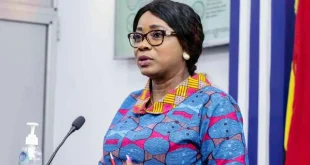International rating agency Fitch has further lowered Ghana’s long-term creditworthiness from “C” to “Restricted Default” (RD).
Local-currency domestic bond issuance ratings have likewise been lowered to Default (D) from “C.”
Fitch also confirmed Ghana’s Long-Term Foreign Currency (FC) IDR at “C” in a statement.
Fitch normally does not provide sovereigns with ratings of “CCC+” or below Rating Outlooks.
A bond, loan, or other significant financial obligation may have an uncured payment default or distressed debt exchange, in Fitch’s opinion, but the issuer has not yet filed for bankruptcy, been placed under administration, receivership, liquidation, or undergone another formal winding-up procedure, or otherwise ceased operations.
According to Fitch, Ghana’s domestic debt exchange offer was successful, which led to the downgrading of the country’s local currency-denominated debt.
This transaction is a component of the recovery plan for which the government is looking to the IMF for assistance.
Ghana and the IMF came to a staff-level agreement on a three-year Extended Credit Facility (ECF) arrangement worth roughly USD 3 billion on December 12, 2022.
All holders, except pension funds, of 67 eligible bonds governed by Ghanaian law and denominated in Ghanaian Cedis (GHS) were invited to exchange their holdings into new bonds with the same aggregate principal amount, plus applicable capitalized accrued and unpaid interest, which has in the aggregate a lower average coupon and extended average maturity than the old bonds.
Collective investment schemes and individual holders below the age of 59 will receive bonds maturing in 2027 and 2028 with a 10% coupon. Individual holders aged 59 or older will receive bonds maturing in 2027 and 2028 with a 15% coupon. All other participating holders will receive a set of bonds with maturity dates ranging from 2027 to 2033 in exchange for bonds maturing in 2023, and a set of bonds with maturity dates ranging from 2027 to 2038 in exchange for bonds maturing after 2023.
All these bonds will pay a 5% cash coupon and a paid-in-kind coupon of 3.35% to 5.00% until February 13, 2025, and cash coupons ranging from 8.35% to 10.00%, depending on the specific series, from February 14, 2025.
In Fitch’s view, the debt exchange constitutes a distressed debt exchange under the agency’s criteria, given this material reduction in terms vis-à-vis the original contractual terms, and given that the exchange is needed to avoid a traditional payment default.
According to Fitch’s sovereign rating criteria, an ‘RD’ rating is consequently assigned to the Long-Term Local Currency Issuer Default Rating. Among the 67 eligible bonds that could be tendered, six are rated by Fitch. A ‘D’ rating has been assigned to these six bonds.
According to Fitch, a principle payment of GHC4.2 trillion was due on February 6, 2023.
Authorities said that eligible holders owning this bond will not receive a final interest payment and a final principal payment, regardless of whether an eligible holder has tendered or not, in the second modified and restated exchange memorandum published on February 7.
The Finance Ministry declared in a news statement on February 14, 2023, that coupon payments and maturing principal will be honored “in accordance with Government fiscal commitments.”
However, according to Fitch, this notice does not yet specify when the money would be given to holders who choose not to participate in the domestic debt swap.
It is unclear, in particular, if a principle payment will be made for this particular issue before the grace period expires.
One of the six concerns that have been reduced to “D” is this security.
Source: Ghanatodayonline.com
 Ghanatodayonline.com News, Politics, Health, Education & More
Ghanatodayonline.com News, Politics, Health, Education & More



